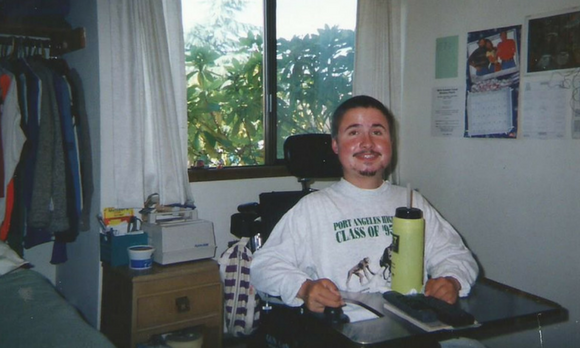 Repositioning loved ones so they can sleep comfortably throughout the night. Making and serving nutritious meals. Providing transportation to school, work, appointments and everything in between. For many family caregivers, caregiving is an all day every day responsibility.
Repositioning loved ones so they can sleep comfortably throughout the night. Making and serving nutritious meals. Providing transportation to school, work, appointments and everything in between. For many family caregivers, caregiving is an all day every day responsibility.
The theme of this year’s National Family Caregiver Month, held each November, is “Caregiving Around the Clock.” And for family members of individuals living with neuromuscular diseases, caregiving can more often than not be a full time job — and an all family affair.
But caregiving affects more than just the person receiving care. Caregivers, too, are inexorably impacted by their experiences. Just ask Tammi Moses. Much of her life was shaped in some way by being a caregivier for her brother, Daniel.
“We were all involved in his care in some way,” says Tammi of her late brother, who was diagnosed with Duchenne muscular dystrophy (DMD) at the age of 3.
Though he passed away at age 27 in 2004 Tammi remembers his positive attitude most. “He had a great sense of humor and he loved going to MDA Summer Camp. It gave him a chance to get away from his parents and annoying older sister and just hang out with other people who understood what he was going through,” says Tammi.
As a teenager, Daniel underwent a six hour surgery and spent two weeks in the hospital before being able to return home.
“Coming home was a challenge as the house had to be cleared out in order for him to even be able to get around,” says Tammi.
As it is with many families, providing care for Daniel was a shared responsibility among Tammi and her parents.
“My dad did daily exercises to keep Daniel’s legs as operational as possible. He also did a lot of the heavy lifting as my brother’s mobility decreased. When Daniel was a high school freshman, I was a high school senior and I would help him out during our lunch break. We spent our lunchtime eating quickly, getting him a bathroom break and then off to afternoon classes,” says Tammi.
While they all played a part in caregiving for Daniel, Tammi remembers that her mother was the main caregiver.
“It’s exhausting and heartbreaking being a caregiver. I am not quite sure how my mother kept up with all his needs. It was such a hard diagnosis and as Daniel aged his care became rather consuming. From bathing to bed pans and needing assistance to even turn the page of a book or itch his nose, it could be very frustrating for Daniel to need that level of assistance for such basic things. Also it can be frustrating for the caregiver as well, as it can be quite exhausting,” says Tammi.
 Caring for Daniel also changed the course of Tammi’s personal and professional lives. Inspired by her experience, Tammi now uses her voice and talents to raise awareness for and empathize with families who are overwhelmed due to medical issues as well as helping families struggling with extreme clutter. As a carrier of the DMD gene mutation, Tammi also made the difficult decision not to start her own family, given her own heartbreak over her brother’s disease.
Caring for Daniel also changed the course of Tammi’s personal and professional lives. Inspired by her experience, Tammi now uses her voice and talents to raise awareness for and empathize with families who are overwhelmed due to medical issues as well as helping families struggling with extreme clutter. As a carrier of the DMD gene mutation, Tammi also made the difficult decision not to start her own family, given her own heartbreak over her brother’s disease.
But for all that caregiving has changed for Tammi, she recognizes that there is no greater calling — or sacrifice — than being there for a loved one in intimate ways few outsiders could imagine.
When asked what advice she would give to other family caregivers Tammi was quick to share the importance of relying on others.
“Don’t try to do it all yourself,” she says. “There is help out there, but you have to be willing to accept it. If you need help with housework, laundry and the errands understand that it is a sign of strength to recognize that you need assistance. If you are able to find someone to do respite care, take advantage of that option and take some time for you, your spouse, and your other kids.”
Tammi is just one of many thousands of family members whose lives have been changed by caring for a loved one with a neuromuscular disease. This month — and every month — MDA reognizes and honors the commitment, loyalty and bravery of family caregivers. For more about caregiving, visit our resources page.
Help us continue to provide support for MDA families.
